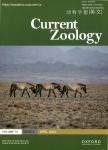Opposed elevational variation in prevalence and intensity of endoparasites and their vectors in a lizard
Opposed elevational variation in prevalence and intensity of endoparasites and their vectors in a lizard作者机构:Centro de Investigaciones sobre Desertificacion-CSIC Ctra. Naquera Kin. 4.5 Moncada Valencia E-46113 Spain Departarnento de Ecologia Evolutiva Museo Nacional de Ciencias Naturales-CSIC c/Jose Gutierrez Abascal Madrid E-28006 Spain Unit of Ethology and Animal Welfare Faculty of Veterinary University CEU Cardenal Herrera Alfara del Patriarca (Valencia) E-46113 Spain Servicio de Control de Mosquitos DiputaciGn Provincial de Huelva Centro de InvestigaciGn Biornedica en Red Epidemiologia y Salud Publica (CIBERESP) Huelva Spain CIBER de Epidemiologia y Salud Peblica (CIBERESP) Spain Departamento de Biogeografia y Carnbio Global Museo Nacional de Ciencias Naturales-CSIC C/Jose Gutierrez Abascal 2 Madrid E-28006 Spain Departarnento de Ecologia de Hurnedales Estacion Biologica de Dofiana-CSIC c/Americo Vespucio s/n Sevilla E-41092 Spain Departamento de Zoologia Facultad de Ciencias Universidad de Granada Granada E-18071 Spain
出 版 物:《Current Zoology》 (动物学报(英文版))
年 卷 期:2018年第64卷第2期
页 面:197-204页
核心收录:
学科分类:090603[农学-临床兽医学] 08[工学] 09[农学] 0906[农学-兽医学] 0835[工学-软件工程] 081202[工学-计算机软件与理论] 0812[工学-计算机科学与技术(可授工学、理学学位)]
基 金:funded by the European Union the Spanish government (Ministerio de Ciencia e Innovacion and Ministerio de Economia y Ciencia (FEDER-MINECO) supported by two predoctoral grants from the Ministerio de Ciencia e Innovacion (FPU program) partially supported by a Ramon Areces Foundation postdoctoral fellowship and by a Juan de la Cierva contract
主 题:elevation immune system parasite distribution Psammodromus algirus reptile
摘 要:Studying the causes of parasite geographic distribution is relevant to understand ecological and evolutionary processes that affect host populations as well as for species conservation. Temperature is one of the most important environmental variables affecting parasite distribution, as raising temperatures positively affect development, reproduction, and rate of transmission of both endo- and ectoparasites. In this context, it is generally accepted that, in mountains, parasite abundance decreases with elevation. However, empirical evidence on this topic is limited. In the present study, we analyzed the elevational variation of hemoparasites and ectoparasites of a lizard, Psammodromus algirus, along a 2,200-m elevational gradient in Sierra Nevada (SE Spain). As pre- dicted, ectoparasite (mites, ticks, mosquitoes, and sandflies) abundance decreased with elevation. However, hemoparasite prevalence and intensity in the lizard augmented with altitude, showing a pattern contrary to their vectors (mites). We suggest that tolerance to hemoparasites may increase with elevation as a consequence of lizards at high altitudes taking advantage of increased body condition and food availability, and reduced oxidative stress. Moreover, lizards could have been selected for higher resistance against hemoparasites at lowlands (where higher rates of replication are expected), thus reducing hemoparasite prevalence and load. Our findings imply that, in a scen- ario of climate warming, populations of lizards at high elevation may face increased abundance of ectoparasites, accompanied with strong negative effects.



